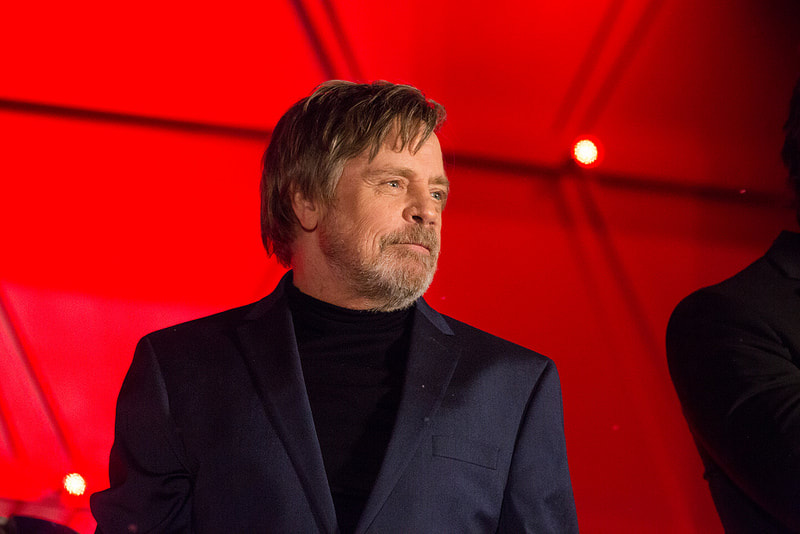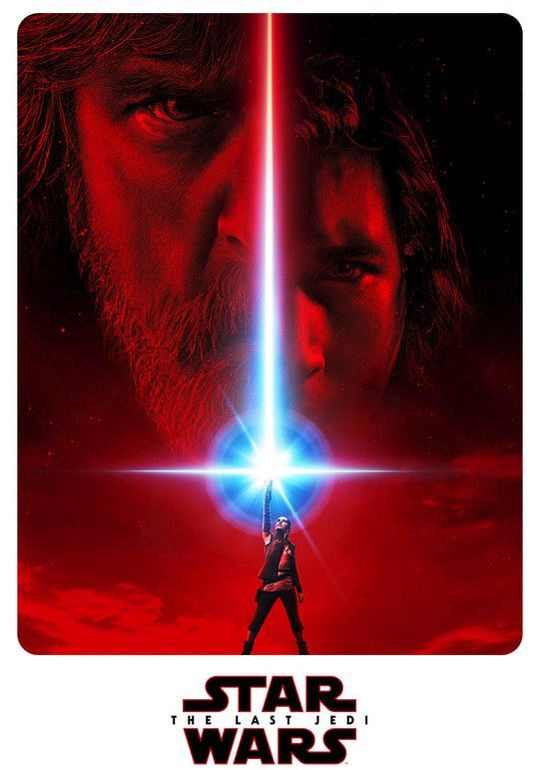|
Rules: Only two this time:
By Sam OH MY GOSH.
The end of 2017 is shaping up. It feels like Mueller is closing in on Trump. Christmas is coming. Soon, the days will grow longer instead of shorter and Lucasfilm produced an EXCELLENT MOVIE: THE LAST FREAKIN’ JEDI. Okay, okay—my excitement is abated; I’m slowly transitioning into critical thinking 25-year-old Sam, not 4-year-old Sam. (MAJOR SPOILERS AHEAD) Rules: Only two this time:
Star Wars Best Narrative Arc: My Theory of Balance Between The Jedi and Sith, Dark and Light, Darth Vader, Luke, Rey, and The Last Jedi By Levi My favorite narrative within the Star Wars universe may seem a bit obvious, which is of course, the battle between dark and light, the Jedi and the Sith—but I believe it is the crucial element to the franchise’s success and failure. It is essentially both a success and failure in storytelling as the story and narrative backbone is there in the original series (4,5,6) then muddled and glossed over in the 1st, 2nd, and 3rd, and I think (I hope) to reappear in the The Last Jedi released on the 15th. George Lucas wrote nearly the perfect story, only it was essentially obscured by bad acting and Jar Jar Binks and Anakin acting all emo in the prequels. I first came across this theory, i.e., “George Lucas Nearly Wrote the Perfect Prequel Trilogy. He Just Didn’t Realize it,” by Games Radar writer James Houghton. The gist is this: The entire Star Wars universe exists in a clear black/white binary which is very obvious in the originals and then more complicated and less obvious in the prequels. The Jedi and the Sith are both good and bad; the Jedi in the prequels exist in a slightly fanatical/dogmatic/militaristic type rule, and the Sith want self-expression and freedom not granted by the Jedi. Hence, the omnipresent idea of “balance” throughout the series. Only in the prequels, Anakin’s behavior and decision to choose the dark side and hence make one of the most enigmatic and compelling villains ever—Darth Vader!—is obscured by loads of bright CGI colors, a soap opera-like love story, Hayden Christiansen’s moody face, lots of talk about trade negotiations, unexciting battles where there is no narrative tension about who is going to win, and just poor direction. You see, Lucas had the story the whole time, it just got lost in the haze. I don’t know if it was Lucas’ fault or not, or the behemoth of opinions and financing from production companies and producers, or one other of the million things can go wrong once a movie goes from the script to filming and editing, and starts to play in theaters. Maybe it was clearer in the original draft of Lucas’ prequels? I don’t know. Somewhere though, this idea of balance and who was really good and bad started off strong and got lost in the prequels. Richard Brody, film critic for The New Yorker, says of Lucas and the prequels, “I suspect that the world-making, the narrative architecture of the self-extending mythological power of the “Star Wars” series, got in the way of its own realization. Could the word be too sacred to Lucas for him to subordinate it to the profane cinematic image? Could the import of the invented mythology be too great, in Lucas’s mind, for him to subject it to the ambiguities of visual transformations? Did he know, or surmise, that the enduring authority of the series would be based not in his direction—however original and distinguished—but in his stories? And, if so, did he conclude that he wasn’t prepared to submit them to the all-too-readily misunderstood realm of the image?” But, as we see from–gasp! It’s coming so soon!–this new The Last Jedi trailer, Luke states, “It’s time for the Jedi to end.” Why? I personally don’t think Luke or Rey will turn to the dark side (or have turned). Perhaps Rey will turn dark, for a second, then return. Or perhaps Kylo Ren will turn light. Any of these things could happen. However, I think it’s time for both the Jedi AND the Sith to end. Perhaps neither the Jedi nor the Sith held all the answers–the Jedi too dogmatic and evil and controlling in their own way to keep “peace,” the Sith too evil and passionate and averse to democracy. Maybe it really is about balance or about having no light and dark sides at all. Perhaps it’s about a way of making them co-exist. Is that not why Darth Vader was/is the most powerful Jedi/Sith? Maybe then, following this theory, Kylo Ren and Rey will become “grey Jedi,” like Qui Gon Jin, both light and dark. I mean if that’s the case, isn’t this the most compelling narrative to exist within the Star Wars universe? Or why we love Darth Vader? Because they become characters who are both light and dark, Jedi and Sith? So, my vote for best character/narrative arc would be (obvious I know), the transformation of Anakin Skywalker into Darth Vader and the reasons/philosophy behind it. After all Anakin is the embodiment of someone who has had to grapple with both the light and dark sides of the force and himself. Luke did for a second, at the end of Return of the Jedi, and rumor has it that Count Dooku had a similar thing happen a long time ago. But really the transformation of Anakin Skywalker into the villain Darth Vader and his battle between the two is the most compelling narrative arc of Star Wars, only obscured, as mentioned above, by the less than stellar direction of the prequels. However, if The Last Jedi returns to this idea of balance in the force this Thursday—between the Jedi and the Sith, the Dark and the Light—we could see a lot more plot twists, a lot more ambiguity, and a lot more compelling narrative arcs with Rey and Ren and Luke. Who knows. I guess we’ll find out on the 15th, this Thursday. Next up: Sam Second Up: Levi RogersDavid Simon, The Wire, and Middle Management
Prostitutes. College students. Drug dealers. Businessmen. Pimps. Tax collectors. Politicians. School teachers. Soldiers. Trombone players. Dockworkers. These are the characters of David Simon’s many works of television. Simon, of course, has written and directed a plethora of HBO shows, nearly all critically acclaimed, from The Wire to Generation Kill and Treme, and most recently, The Deuce. I know it’s a bit obvious to write about The Wire as the best writing/best T.V. show out there, especially if you haven’t seen it. You’re probably sick of people like me going on and on about how great it is, how brilliant, how you need to watch it. So instead, I’m just going to tell you one aspect of the show that appeals most to me, and why, based on that, it is the greatest show ever made. I mean I love Sam and Sherlock is a good show, but it’s not a great one. The last season felt a bit wandering, repetitive, and a bit loose. I like New Girl okay too, mainly for Schmidt and Winston, but as a contender for best T.V. show ever? No way. Friends, fine. Cheers, fine. Gilmore Girls and Dr. Who, actually haven’t seen them. Parks and Rec might be the best sitcom comedy out there, but yes, disqualified. Archer is amazing and I will argue nothing against it. I would also put up Silicon Valley as a contender. So, why is The Wire or any of Simon’s other shows the “greatest?” Or perhaps, why do I like it so much? Because it is one of the few shows out there to write and document everyday people and everyday characters in everyday situations just trying to make a living and somehow transforms the whole thing to the level of art and a meditation on the human condition. It’s not a cute and tidy sitcom. Neither is it heroic like Game of Thrones. And it’s not based on dramatic premises like some terrorist puzzle to solve in 24 hours or a chemistry teacher turning into a drug dealer. The only other shows that come close for me are Fargo, The Sopranos, and Mad Men (although I just started watching Ozark and it’s pretty damn good, but only in the first season, though). In a recent interview with Simon for The New Yorker Radio Hour podcast, David Remnick, editor of The New Yorker, says there is, “a powerful sense of labor” in his work, even when it’s undignified labor. Simon agrees and responds by saying that their (he and writer/creator George Pelecanos of The Deuce) lens might be best described as that of middle management. Simon says that whether it’s with trombone players, recon marines, cops, or drug dealers, “Our hearts are either with, or on the assembly line or with middle management, that’s where our point of view is always strongest” (New Yorker Radio Hour. September 29, 2017). And then they ask, “Where does the power and money route itself?” For some reason, that idea struck me. It’s completely obvious of course, but I loved the prosaicness of Simon’s description: “Middle management”. What else sounds both utterly mundane and yet a necessary role filled by many of us in modern life. Middle-level management is why I loved The Wire and the T.V. shows of David Simon. Middle Management. Folks who work on the assembly line or are just trying to make a living. Parks and Rec and The Office come close to such thing but they’re sitcom comedies and do not contain the same depths of the human experience. Our lives are currently dominated by the rich and famous. The sexy and wealthy. The politically savvy and the powerful. From Reality Housewives to Keeping up with the Kardashians and our current president. No matter how utterly moronic they might be. I imagine this has always been the case throughout history, though, I would argue that in this day and age, it feels particularly force fed to us by social media, smartphones, and twenty-four hour news cycles. So, enter Stringer Bell, a second-in-command drug boss who is also taking community college classes and hoping to one day graduate from the streets to the business world. Enter McNulty, a cop with a good heart who also drives around drunk. Enter Candy, a prostitute who is her own boss and makes an entry into the camera-side of the pornography business. Enter bartenders and drug dealers and good cops and bad cops and corrupt politicians and decent ones. Enter a whole host of characters just like us. Because I have spent many years in church, I also can’t help feeling like these are the same type of people Jesus hung out with two thousand years ago—fishermen, prostitutes, zealots. Jesus having very little time for the rich and famous, the powerful and connected, and instead spending his time with middle management. The type of people we pass in the street on a daily basis. Or I should say, like most of us pass and encounter—middle-class, proletariat us—those of us who are neither extremely wealthy nor extremely poor. Right in the middle. People below and above. Enter humanity. All of the above is exemplified by the writing in Simon’s shows. It’s so human, believable, and relatable that I feel more like I’m reading a novel on the human condition than watching a T.V. show. And that’s just one reason out of several for why The Wire is the best show ever made for television. This is to say nothing of the realistic dialogue across political and socio-economic and racial spectrums. The plot set-ups, payoffs, and twists. The character development over multiple seasons. The narrative tension. The moral ambiguity. The social commentary. The interpersonal relationships. All of which leads to something utterly transcendent and yet completely down to earth. |
AuthorOur fabulous blog team Archives
June 2024
CategoriesAll 12 Songs Art Art And Athletes Book Review Chorus Blog Date This Book Game Of Narratives Guest Blog Letter From The Editor Lifehacks Movies Of 2019 Music Pup Sounds Smackdown Strive For 55 Summer Playlists |





 RSS Feed
RSS Feed